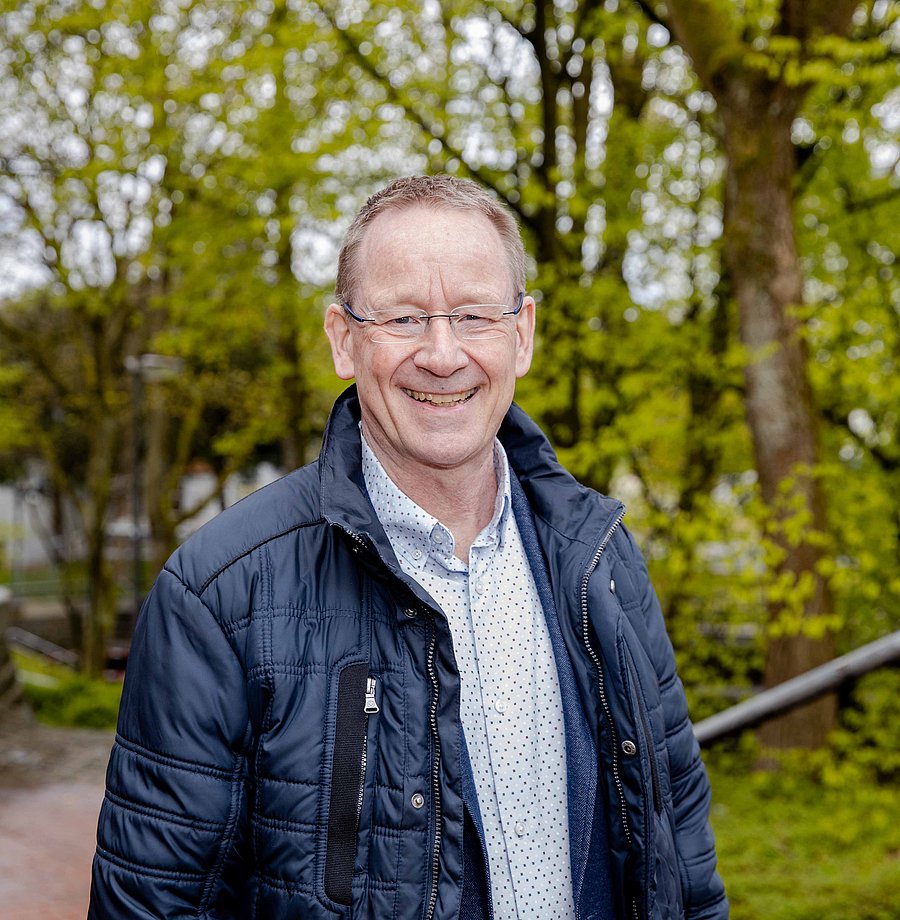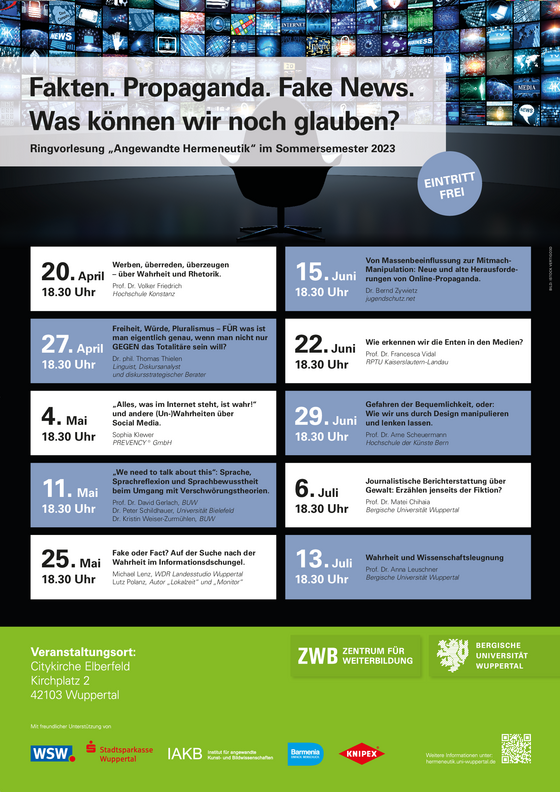
Lecture Series - Facts, Propaganda, Fake News
Prof. Dr. Kurt Erlemann / Protestant Theology
Photo: Sebastian Jarych
Every language is manipulative somewhere
Theologian Kurt Erlemann, together with the university-wide project group "Applied Hermeneutics" and the Center for Continuing Education at BUW, is organizing the lecture series "Facts. Propaganda. Fake News. What can we still believe?" at the CityKirche Elberfeld.
The moon landing did not happen, Elvis is alive, and cancer can be treated naturally are just three examples of false reports that make many people doubt the truth. News about the war in Ukraine cannot be checked for truth, and there have been countless reports about the Corona pandemic in recent years that confuse more than they enlighten. The German government has even set up its own website to deal with disinformation. So what can we still believe? This is the subject of a lecture series at Bergische Universität, organized under the direction of theologian Prof. Dr. Kurt Erlemann in the Citykirche Elberfeld, which offers help in understanding in ten lectures.
Are there objective truths?
"What we are experiencing at the moment," says Kurt Erlemann, "is that we can no longer distinguish credible and untrustworthy reports!" Conspiracy theories and war propaganda are often no longer recognizable to the user, he says; moreover, dubious news channels push this information, and the lecture series is about illuminating the differences in reporting from different angles. "With the speakers, we want to work that out." In addition, there is the question of the fundamental truth content of information. Erlemann uses a simple example to illustrate this: "Let's take a traffic accident. The police come, question three witnesses about what happened and get three different versions. So truth is always subjective, and the question is: What does that mean for the gain of knowledge, for the trustworthiness of truth, if we know that it is always perspective. It is never objective in that sense, because it can't be."
Learning to understand content
The goal of this lecture series is to strengthen the competence of students and people in professional life to understand and communicate cultural content. In doing so, the very title of the series points to the problem. What can we still believe in terms of factual and fictional storytelling? What truth content does advertising represent, journalism, we receive via social media, propagate propaganda or deny fake news? To explain this, Erlemann chose an interdisciplinary approach and engaged an illustrious panel of speakers with proven expertise. "We have contributions from narrative research -so what, for example, is the truth claim of a narrative as opposed to a journalistic report?-, we have rhetoricians, communication designers, philosophers, linguists, discourse analysts, management consultants, teacher trainers, we have experts from radio and television, journalists as well as political advisors on board. The whole issue of truth is multi-perspective, and that's how we approach it." Written genres are distinguished, showing that fairy tales are not the same as press reports, the scientist explains. The focus is on manipulation, whose motives, possibilities and forms are illuminated, because, he says, "All language is manipulative somewhere, but there are limits to what is serious, and that's what we need to find out." All lectures offer interaction and work with plausible examples for the audience.

Poster: Lecture series
A reliable truth
The lecture series aims to provide people with guidance on the question of what constitutes a 'reliable truth'. Erlemann puts it this way: "Truth is reliable when the content of what is said or written is verifiable, when its origin is transparent, and when its effect is congruent, that is: when what is said or written does not turn out to be an illusion or simply false. Truth in the Christian-theological sense is something that is reliable, that is wholesome in its effect. There you also already have a good criterion for distinguishing between a reliable truth and propaganda, because propaganda does not necessarily serve a wholesome purpose."
Addressing target groups with Wuppertal start-up
In times of digitalization, many messages reach us today via social media platforms. However, Twitter, Tik Tok and the like also have their pitfalls, often spreading untruths and thereby inflaming user sentiment. Under the title "Everything on the Internet is true," for example, Sophia Klewer, an employee at Wuppertal-based start-up PREVENCY® GmbH, reports on the opportunities and risks of social media and their influence on our understanding of truth. "Through social media, you reach a completely different dimension of communication," explains Erlemann, "and it's not always only positive."
Recognizing fake news
Another lecture deals with fake news, which is becoming increasingly important even in the school classroom, but which must first be recognized linguistically. "If you just look at the gender debate, after all, we are shown from all sides how language also transports certain clichés, realities, images and prejudices of which we are not always aware. This really does have an impact on our view of reality, on the way we deal with language," says Erlemann. He adds that this places a particular demand on school teaching staff, whose important task is to sensitize students in this direction, because conspiracy theories often determine the discourse in schools and lessons.
Propaganda - a manipulative use of language
The lecture series also takes up the topic of propaganda. Especially with regard to the Ukraine war, it is difficult for young and old to recognize truths. Dr. Bernd Zywietz, Head of Political Extremism at the Netzwerk Terrorismusforschung association, will provide information on the history of the term and its development up to its current use in social media. Among other things, the lecture also offers assistance in dealing with manipulative language.
The lecture series will kick off on April 20 with publicist Prof. Dr. Volker Friedrich from Konstanz University of Applied Sciences. "He is a professor of communication design and rhetoric," adds Erlemann, "and will take us on a journey to determine the relationship between truth and rhetoric, on a search for criteria to distinguish between legitimate advertising for convictions and populist persuasion."
All free meetings begin at 18:30 o'clock in each case on Thursdays in the CityKirche Elberfeld, Kirchplatz 2. All dates under https://hermeneutik.uni-wuppertal.de/de/ringvorlesung-fakten/
Uwe Blass
Kurt Erlemann studied Protestant theology in Munich, Zurich and Heidelberg. He received his doctorate in 1986 and then worked as a vicar of the Baden State Church and as a school pastor. After his habilitation, he took on teaching positions in Hamburg and Koblenz. Since 1996 he has held the chair of New Testament and History of the Early Church at Bergische Universität.
